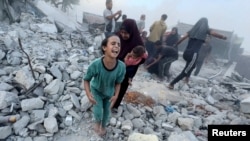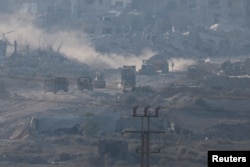Israel is studying "some ideas" that Hamas sent to Qatari mediators on Wednesday, and Israel confirmed it is evaluating Hamas’ response to a peace deal that would include releasing hostages and a cease-fire.
"The mediators of the hostage deal have given the negotiating team Hamas' response to the hostage deal outline. Israel is examining the response and will respond to the mediators," said a statement released by Prime Minister Benjamin Netanyahu's office, on behalf of Mossad.
The mediators, Qatar, Egypt and the United States, have worked for months to reach a deal that would free the hostages and cease hostilities. The ideas that Hamas delivered Wednesday involve the three-phase deal U.S. President Joe Biden put on the table in late May.
While Netanyahu’s government studied the Hamas offering, Israeli forces carried out attacks in the central and southern Gaza Strip as thousands of Palestinian civilians were on the move, seeking new areas to shelter after the latest Israeli evacuation order.
The Israeli military said it targeted Hamas fighters with airstrikes in the southern city of Rafah. In the central city of Deir Balah, another strike killed three people in a car, local officials said.
In northern Gaza, ground operations took place in Shujaiya, an eastern area of Gaza City.
The United Nations has expressed concern over Israel’s latest evacuation order for large parts of Khan Younis and Rafah governorates, encompassing about a third of the Gaza Strip and affecting up to 250,000 civilians.
An Israeli airstrike on Tuesday killed a prominent Palestinian doctor and eight members of his extended family after they complied with military orders to evacuate their Khan Younis home and move into an Israeli-designated safe zone.
“What we saw in the last two days, since Monday afternoon when the evacuation order was issued, we have seen a constant flow of people moving out,” said Andrea De Domenico, the U.N.’s head of office for humanitarian affairs in the Palestinian territories.
He told reporters in a video briefing Wednesday from Jerusalem that U.N. aid agencies and their partners are having to reset their operations following Israel’s evacuation order.
“Delivering for us is a daily struggle — literally,” he said.
Israel has repeatedly told Palestinians to leave certain parts of Gaza, usually ahead of military offensives, in a move Israel says is meant to protect civilians from the war. The evacuations, along with the fighting, have meant people have had to flee multiple times in search of safety.
De Domenico said the U.N. estimates that every 9 out of 10 Palestinians in Gaza has been displaced at least once, and some up to 10 times, since the war started between Israel and Hamas in October.
He said most people on the move this week have headed toward coastal area, where Israel has established a so-called safe zone. De Domenico said the area is overcrowded and overwhelmed, with little clean water, few toilets and limited basic services.
“Nowhere and no one is safe in Gaza,” De Domenico said. “We keep on saying this. We have seen over and over military operations and bombardment happening also in the heart of the humanitarian safe zone declared by Israel.”
Stabbing attack in Israel
Meanwhile, in Israel, one person was killed and another wounded Wednesday in a stabbing attack at a shopping mall in the northern city of Karmiel.
The Times of Israel reported that both victims were off-duty soldiers. It said the slain officer, age 19, shot and killed his attacker before he died. The newspaper said security officials later identified the assailant as Jawwad Omar Rubia, an Israeli citizen from the nearby Arab town of Nahf.
According to local reports, neither Hamas nor Islamic Jihad claimed responsibility for the attack, but both praised it.
Israel's war against Hamas in Gaza erupted when Hamas-led militants stormed into southern Israel on October 7, killing about 1,200 people and seizing more than 250 hostages, mostly civilians, according to Israeli authorities.
Israel's retaliatory offensive has killed nearly 38,000 people, according to the Health Ministry in Gaza, and left the densely built-up coastal enclave in ruins.
VOA U.N. correspondent Margaret Besheer contributed to this report. Some information for this story came from Agence France-Presse and Reuters.






